- AI Marketing School
- Posts
- License to automate 🔫
License to automate 🔫
...and the massive opportunity for consultancy

Hello marketers. Welcome to AI Marketing School, where we dish out the latest and greatest in AI-powered marketing.
In this week’s issue:
AI Marketing Update: All about OpenAI’s Agent
Consultant’s Corner: An enterprise-sized opportunity for consultants
AI Events: Our recommended AI marketing events for networking and connections
Onwards!
AI MARKETING UPDATE
OpenAI drops agent mode
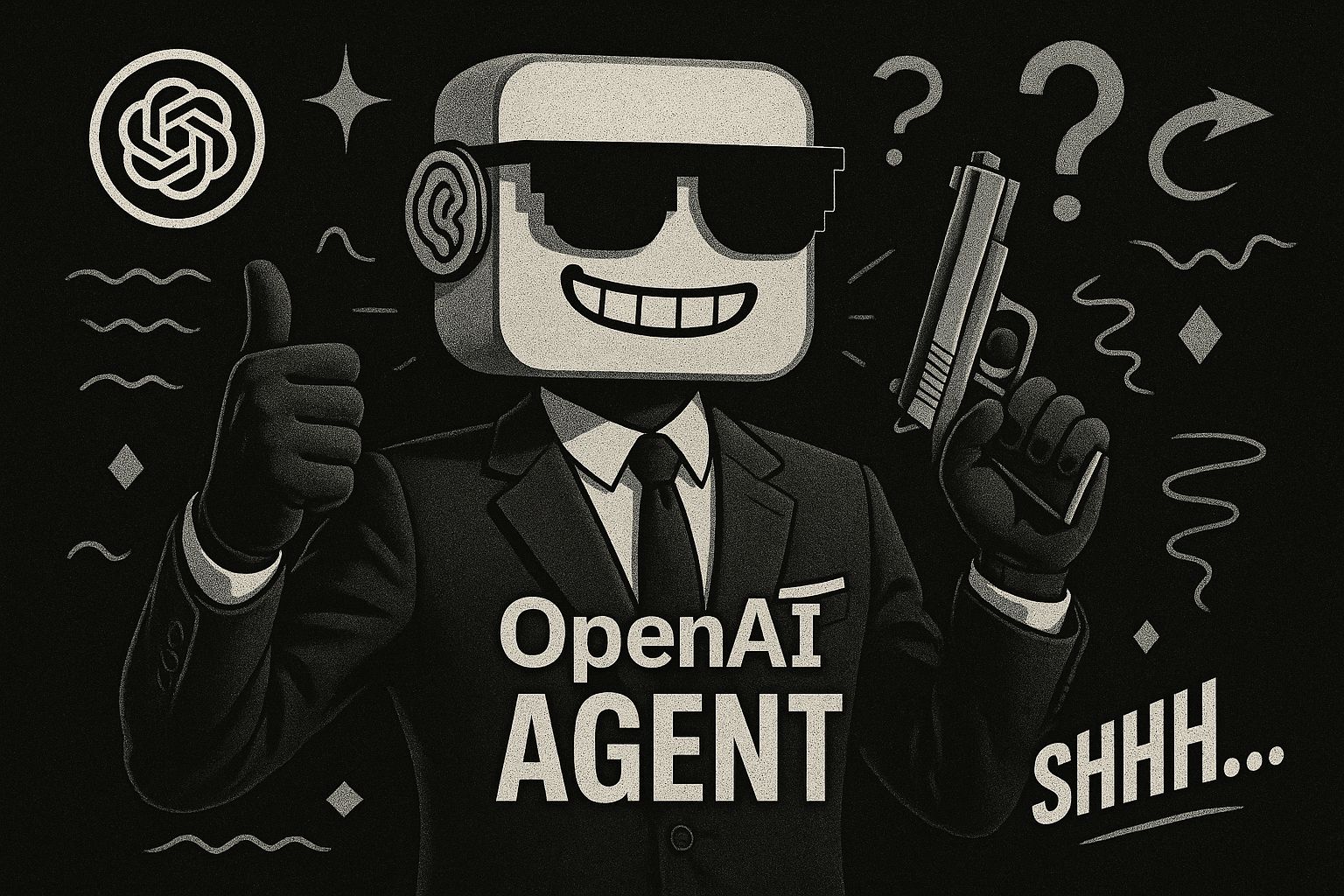
OpenAI Agent has dropped, and it’s proving to be a potentially game-changing tool that I suspect no one has yet found the ceiling of.
Instead of just chatting with you and leaving you to do all the work, Agent can navigate websites, create presentations, and handle intensive multi-step tasks.
You can also add login details and card information to it.
So, you can go behind paywalls, etc, which limits your use to deep research. This also enables you to buy products, book tickets, etc., without being present (you might want to use a virtual card instead of your credit card, though!).
I have some initial observations of Agent for tasks it’s mostly designed for — looking for products, working things out, personal research, and so on. Here’s what I think:
SEO, kind of, but not as we know it?!
I had a genuine in-the-wild task for agent — to research accommodation for a cycle tour in France and Spain.
Now, Agent is somewhat of an amalgamation of deep research and Operator, which you get a sense of when you use it. For this task, I described my tour, stating that I require accommodation options at roughly 75km intervals along my route.
This is the kind of topic where blogs — many of which are pretty old-school in format (e.g., a real person writing about real experiences) — really came to the fore.
For example, Freewheeling France, seen below, is an evidently independent site maintained by a dedicated team of enthusiasts — the kind that the internet used to thrive off.

Try some consumer-type research with Agent yourself and see how many citations point to tiny sites with likely limited SEO presence. How does Agent find them?
Well, from my reading and that of a few others, it seems to prioritize content that reads naturally and answers specific questions directly — the exact kind of writing that dominated the web before everyone started optimizing for algorithms.
These cycling blogs weren't trying to rank for "accommodation France cycling" — they were just documenting real experiences with genuine detail about where they stayed, what worked, and what didn't.
Yes, there are some bits from TripAdvisor, etc., but Agent pulled information from tiny tourist websites in the Spanish region of Andalucia.

Lots of smaller sites feature in some outputs; probably because Agent needs to construct a rich investigation of the topic for the user - it goes below what you’d find on page 1 and 2 of the SERP
This natural, helpful content is genuinely useful, includes specific location names, and links to relevant resources. These bloggers weren't reverse-engineering Google's algorithm — they were just being helpful humans.
My theory is that AI can parse a rambling 3,000-word trip report and extract the two sentences about a perfect B&B in a village Google Maps barely knows exists.
Semantic understanding means it doesn't require keyword density or meta descriptions — it simply needs genuine, detailed information.
Here’s another example of a product comparison for electric drumkits, which again blends manufacturer info (e.g., from Alesis, who manufactures electric drums) with reviews from affiliate review sites (e.g. DrumSpy):
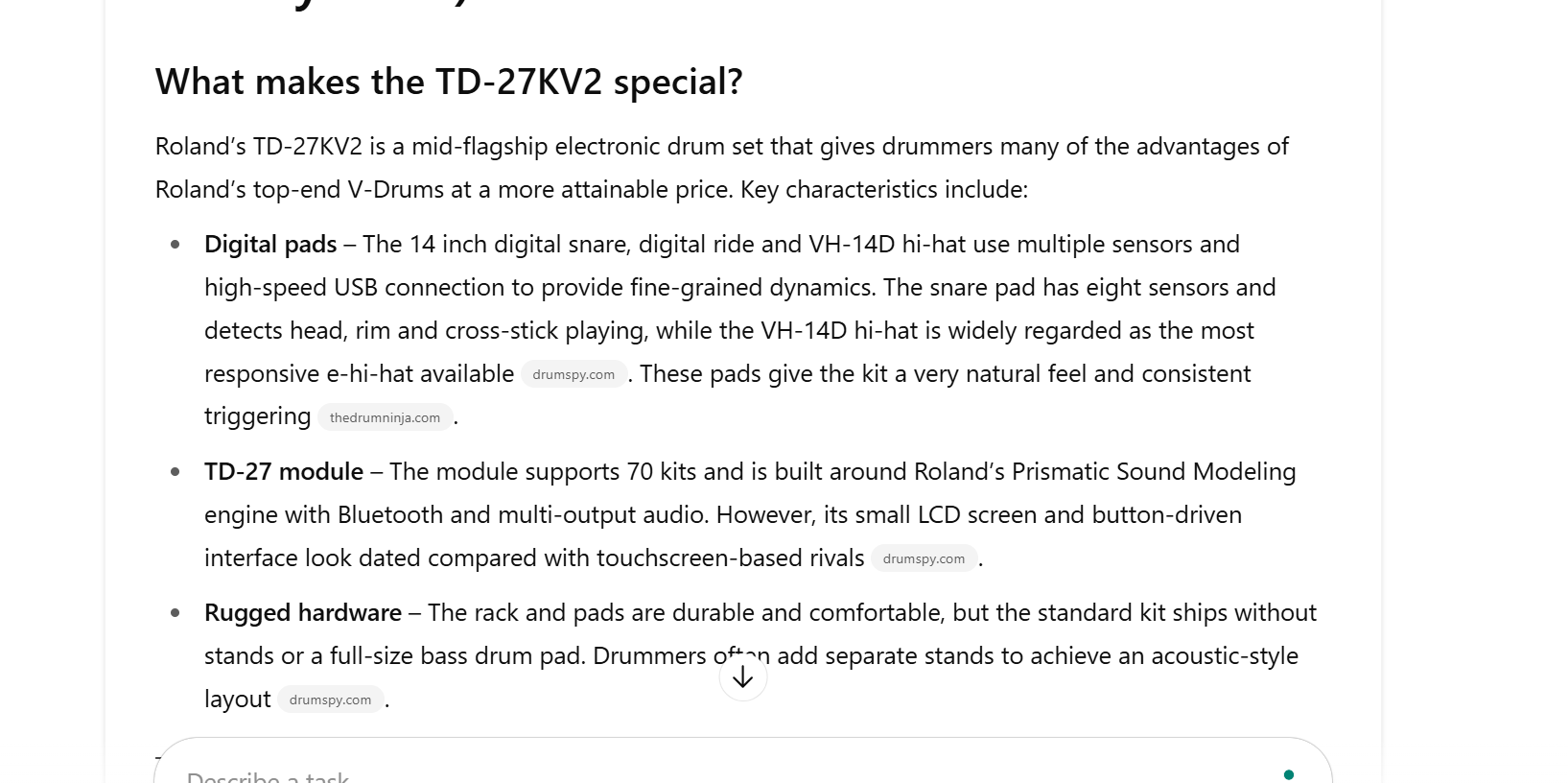
More examples of review sites leading responses
Here’s another example where asking for paving slab (paver) recommendations again pushed me towards smaller independent sites.
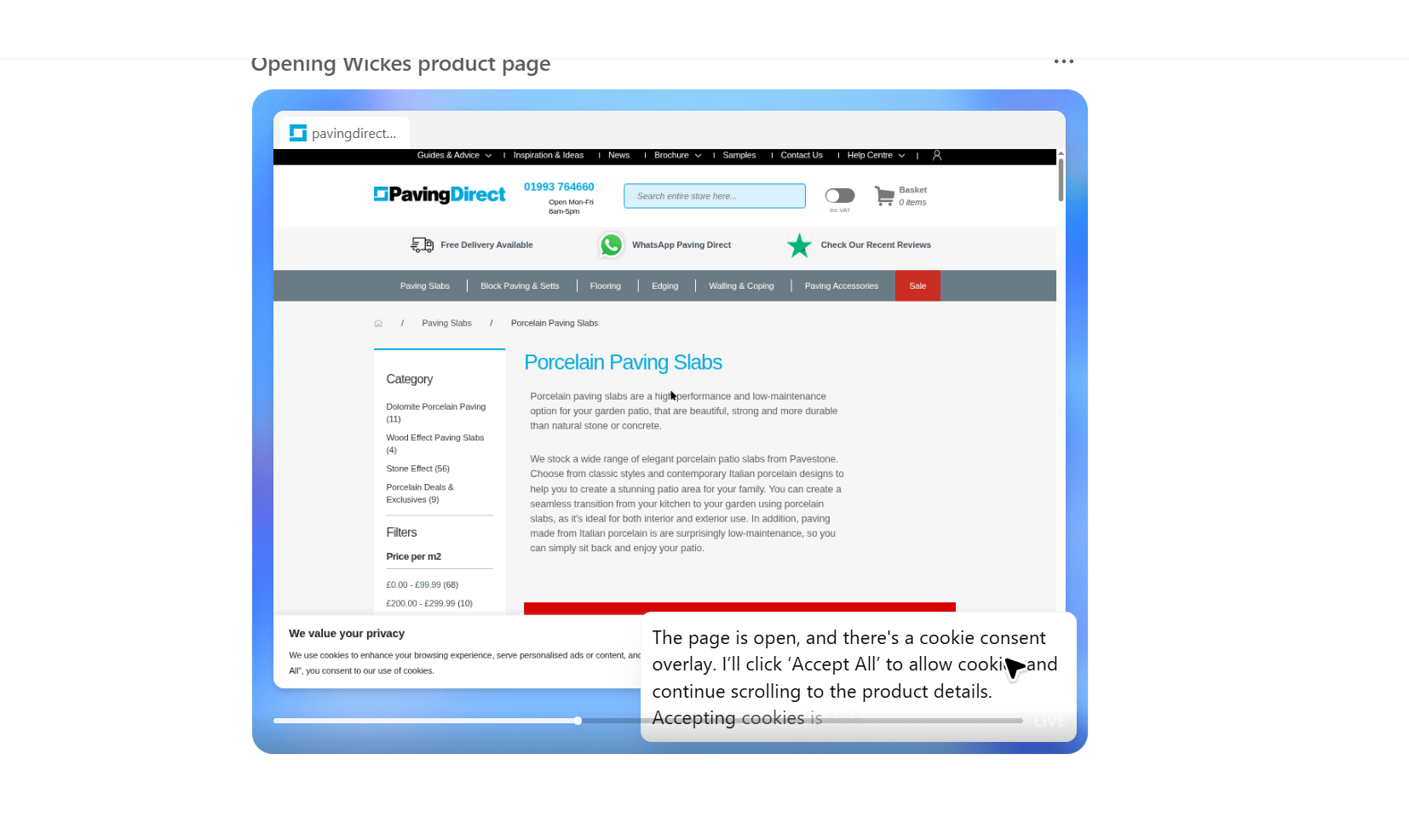
Agent browses an array of sites; it doesn’t end up stuck at the biggest-known brands, thus allowing them to monopolize results
All in all, it seems that Agent does not simply look at a few page-1 SERP results and report its opinion on the obvious sources.
Now, whether or not Agent will bring traffic back to some smaller websites is speculation.
Will people click the links? Will they take its response as gospel and leave it at that? Is Agent simply using sites as its vessel of information without rewarding them in any way?
I honestly don’t know. We will need data to find out.
We recently spoke about zero-click marketing. What we do know is that Agent marks another advancement in that area.
Cross-referencing and semantic understanding
In AI search optimization and LLMO, products and services benefit from diverse mentions across various sites — from major publications to small blogs.
You want your product shouted across lots of sources and channels, in many different (positive) contexts.
That's how it becomes known to chatbots that thrive off natural language…It's the same reason Cristiano Ronaldo is instantly recognizable to any AI system — his name appears in millions of contexts across sports sites, news articles, social media posts, and casual conversations.
The sheer volume and variety of mentions create such a strong semantic footprint that AI models can't help but "know" him deeply.
The same principle applies to products and brands. When your SaaS tool gets mentioned in a TechCrunch article, a Reddit thread, a YouTube review, and someone's personal blog post about their workflow, you're building that semantic density that AI systems rely on.
It's not just about one authoritative source anymore — it's about creating a web of interconnected mentions that establish your product's existence and context in the AI's training data.
That's why the brands winning in AI search aren't necessarily the ones with the biggest SEO budgets, but the ones creating genuine conversations across the most diverse range of platforms and contexts.
In some cases, smaller brands may be able to leapfrog larger ones by doing this properly.
OR, even by positioning themselves parallel to a big-brand product (e.g. an alternative to X, X but for a budget of $X, etc.) because AI systems excel at understanding relational context.
Call it contextual hitchhiking…
This creates what I call "contextual hitchhiking.” Your smaller brand gets pulled into the conversation whenever the big brand is discussed, but only if you've established that relationship across enough sources.
A project management tool that gets consistently mentioned as "like Notion but simpler" in enough blog posts, tweets, and forum discussions can end up dominating AI recommendations for users who want Notion's functionality but leaner.
The same applies to hardware and physical products — "Patagonia durability but Uniqlo accessibility."
This creates opportunities for positioning that traditional SEO couldn't capture.
A cybersecurity startup that consistently gets described as "enterprise-grade protection for small businesses" or "Zoom's ease-of-use but with better security" can own those specific query patterns even if they never rank for "cybersecurity" in Google.
This strongly invokes some of our past research into LLMO and Strategic Text Sequences (STS).
STS are a way to build in those easily digestible mentions that get your brand and product to stick in LLMs.
Agent’s myriad of other uses
Here are some other uses I’ve found that demonstrate Agent’s wide-ranging potential.
Multi-platform data crunching: One podcaster got Agent to automatically log into Buzzsprout, Spotify, and Apple Podcasts, pull retention data from hundreds of episodes, compare year-over-year metrics, and spit out a CSV plus PowerPoint presentation.
Cold email that doesn't suck: Marketing consultant Claire Costa built an Agent that stalks prospects on LinkedIn (in a good way), analyzes their recent posts, then writes personalized emails based on their actual interests. Result: 4.5 hours saved weekly, 12% better reply rates.
Competitor intel on autopilot: Tell Agent to research your competitors and it'll crawl their websites, track pricing changes, monitor product launches, then compile everything into a presentation you can use in meetings.
Attribution modeling across the chaos: One test showed Agent logging into Google Analytics, Meta Ads, Google Ads, and other platforms to create unified attribution reports, though there were some issues.
The "but actually" section
Agent is a signal of what is to come.
Searching for information and gaining knowledge — whether about a holiday destination, a product, or your science homework — is becoming more about the results and how we interpret them. You don’t need to learn the process.
Moreover, it’s still a black box. You achieve results, but understanding how they were achieved can be challenging, even with the live walk-through it provides.
Rather than learning processes, marketers (and indeed others across professions) will need to improve their ability to interpret results. What they mean, if they’re accurate, and the methods behind them.
I can see it being tough to rely on Agent for some high-stakes task where its process is not easily auditable.
And you can schedule agentic tasks!
One thing before we move on…
Agent works with schedules too — vastly leveling up the potential of ChatGPT Tasks.
I covered lots of Tasks-based workflows here. They’ve all just become WAY more powerful.
You can now run reports, create content, conduct research, and more at regular intervals and have the results delivered to you.
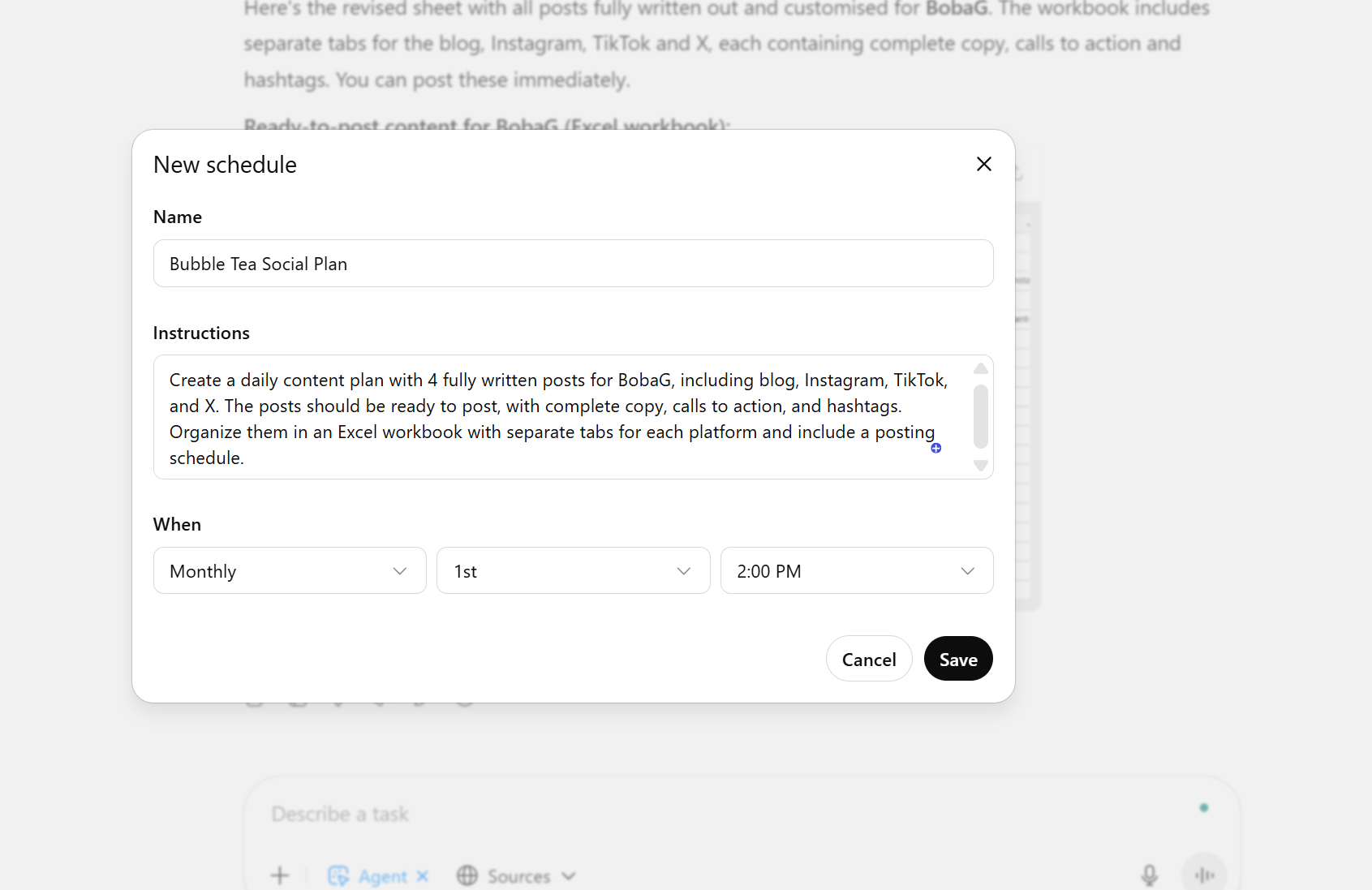
Tasks go agentic
CONSULTANT’S CORNER
The gap between AI adoption and success
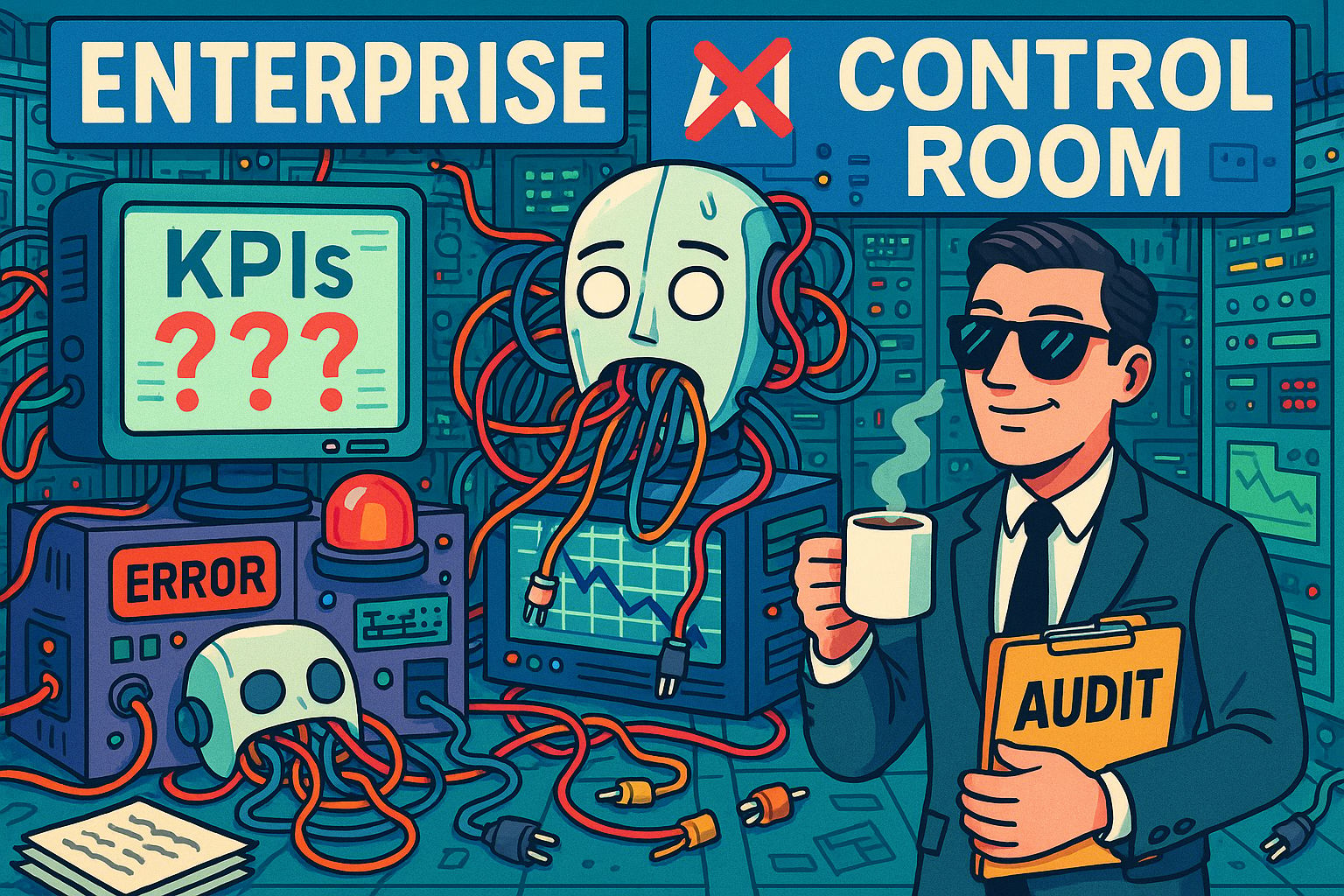
There’s a report I overlooked earlier in the year that I found interesting — McKinsey's report on AI adoption.
It says that 78% of organizations are using AI in at least one business function, which sounds impressive. But only 1% describe their AI rollouts as "mature."
Most organizations haven't seen meaningful bottom-line impact from their AI investments, and less than a third are following basic best practices.
More than 80% aren't seeing tangible impact on enterprise-level EBIT
Less than one in five are tracking KPIs for AI solutions
Most are treating AI like another software rollout rather than organizational transformation
Bad news for enterprises — not so bad for all the freelancers and agencies out there. Building AI capabilities in-house at enterprises is tough, so many will look towards collaborations with external partners. The report found that only larger companies with over $500 million in revenue have dedicated teams driving AI deployment.
This gap creates two specific opportunities you can capitalize on right now:
AI audit and strategy consulting
Most companies have thrown money at AI tools without any coherent plan. They need someone to audit their current AI spend, identify what's working, and create a roadmap for the 80% that isn't delivering results.
Price this as a high-value strategic engagement. Companies are spending thousands monthly on AI subscriptions they're not using effectively — your audit could save them more than your fee in the first month.
Implementation and measurement systems
The 80% of companies seeing no bottom-line impact aren't measuring the right things. They need help establishing effective KPIs, tracking systems, and governance frameworks.
This is essential and well-paid work. Companies will pay premium rates for consultants who can prove ROI with real numbers.
The bottom line
The AI consulting opportunity isn't in building custom models or explaining how ChatGPT works. It's in the critical problem of making AI work inside real companies.
Most businesses are sitting on thousands of dollars of AI subscriptions that deliver zero measurable value. They desperately need someone who can walk in, figure out what's broken, and fix it with concrete business results.
If you can prove ROI with real numbers instead of just AI demos, you'll have more work than you can handle. The companies that crack this first are going to dominate their markets — and they'll pay handsomely for the help.
AI MARKETING EVENTS

🗓️ Recommended AI marketing events
Whether you’re building with AI, leading a marketing team, or just trying to stay sharp in a fast-moving space, events are still one of the best ways to plug in.
Great events do more than just deliver content — they give you context. You get to see what other teams are testing, what’s actually working, and where the market is headed.
They’re also one of the few places where you can meet like-minded people, talk shop with folks solving the same problems, and build a network that isn’t purely algorithmic!
Some top events to check out:
AI Agents Summit (Virtual) — September 18–19, 2025: Laser-focused on AI agents, copilots, and autonomous systems. If you're experimenting with automating parts of your marketing workflow or interested in agent-based design, this one’s worth attending.
AI for Marketers Summit (Virtual) — November 13–14, 2025: Created specifically for marketing professionals. From prompt engineering to campaign automation, it’s a practical look at how AI is being used right now in real teams.
Data + AI Summit (San Francisco) — June 9–12, 2025: Hosted by Databricks, there’s plenty of marketing relevance here — especially around LLM workflows, AI tooling, and future-proofing your stack.
Ai4 2025 (Las Vegas) — August 11–13, 2025: A big-picture AI conference covering finance, healthcare, retail, marketing, and more.
Hope you enjoyed this week’s issue. If you missed the last newsletter, you can read it here.
If you found it useful, please recommend it to a friend or colleague.
Until next time. Happy marketing.
—The AI Marketer